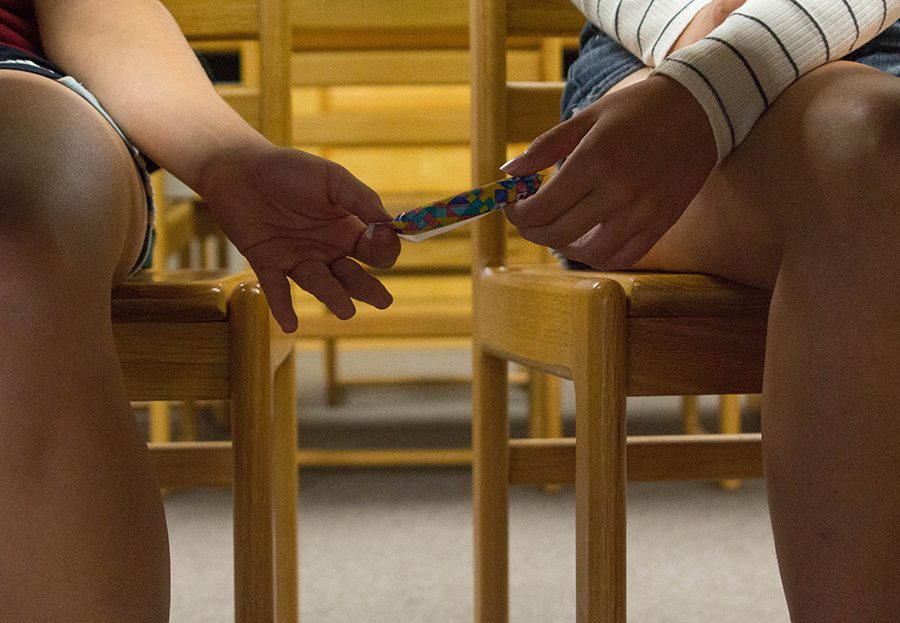Your donation will support the student journalists of Lawrence Free State High School. Your contribution will allow us to purchase equipment and cover our annual website hosting costs.
Club launches drive shedding light on periods
November 17, 2016
A typically private matter, the discussion about menstrual products is being made public by the Young Feminist Club. The club decided to create the Menstrual Product Drive to raise awareness about menstruation and also provide products to those who need them. “I think it is very important for our generation to be aware of who they are and how society treats certain issues,” senior Natalie Adams-Menendez said. “It’s important to help our generation be more accepting of not only women but also ideas by providing products and helping those in need.”
Young Feminists Club is spearheading a Menstrual Products Drive to help those in need and to help normalize periods. The Gay-Straight Alliance has also put their full support into the drive.
All products gathered through the drive, which began Nov. 7 and runs until Nov. 21, will go to the Willow Domestic Violence Shelter in Lawrence; a support organization that has partnered with Young Feminists Club in the past. The Willow provides an emergency shelter to parents and children, a crisis hotline, public workshops and much more in hopes of supporting the healing process of individuals who have experienced domestic violence or human trafficking.
Besides collaborating with Willow and collecting the products, the clubs hope to generate general discussion about menstruation.
“Often when people talk about periods or needing a tampon or pad, people get kind of uncomfortable,” said senior Meredith Shaheed, co-president of the Young Feminists Club. “We need to get rid of that taboo, and we need to be thinking about how this is a natural occurrence…and it’s not something to joke about.”
The discomfort and embarrassment surrounding discussions about menstruation sometimes lead young people around the world to have misconceptions about their health. In Iran, a UNICEF study shows that 48% of young girls think their menstruation is a disease.
For many who menstruate, these products are vital to their comfort and health.
“People can’t go to school without these products,” said senior Diane Camarda, co-president of the Gay-Straight Alliance. “People can’t go to work without these products, and yet, they’re not available to them at shelters when they’re in need.”
The taboo and expenses of menstrual products, as the two clubs have recognized, resulted in a lack of these products at the shelters.
“It’s very important that these products get to the community,” Camarda said. “So that’s why [Gay-Straight Alliance is] supporting [Young Feminists Club] and collecting all feminine hygiene products.”
Both clubs hope to emphasize the importance of inclusive language used to describe menstruation and menstrual hygiene.
“We normally call it feminine hygiene products in our society,” Shaheed said. “But another focus of our drive is to move away from that.”
Shaheed explains the drive aims to be inclusive of all who menstruate, including transgender and nonbinary people.
“It’s really important to us that we open up a discussion about how [transgender and nonbinary people] menstruate too,” Shaheed said. “And how that’s okay, and not just a “female” thing or a “girl” thing anymore.”
Shaheed explains a dilemma women in domestic violence shelters face.
“[Menstrual products are] actually one of the most in demand products for shelters,” Shaheed said. “People don’t usually think to [donate them].”
Shelters lack menstrual hygiene products because of the cost as well as the taboo surrounding menstrual products according to senior Natalie Adams-Menendez, co-president of Gay Straight Alliance.
“It’s not being addressed by shelters because it’s expensive, and being able to run a shelter is expensive,” Adams-Menendez said. “It’s a topic that isn’t brought up because of the stigma, so it won’t be addressed if you can’t actually pose a question.”
For a mother and two daughters without health insurance, menstrual hygiene products could not only cost them over $210, but also, according to a study done by the John Hopkins Bloomberg School of Health in 2015, an additional $100-$160 payment for every visit to the doctor’s office.
A suggested approach to normalizing periods is to include menstrual hygiene products in federal health care and be available for purchase with food stamps.
Many people, including Adams-Menendez, believe the menstrual hygiene industry unfairly profits off of its necessity.
“The tampon and pad industry is able to raise prices because it is a necessary commodity for women and those prices keep on escalating…there’s no regulation,” Adams-Menendez said.
Without these products, some people who menstruate are forced to create their own tools. According to UNICEF’s “WASH” 2012 program, people across the globe often resort to using dirty cloths, leaves or nothing at all during menstruation periods. This lack of access to materials has been proven to leave students more likely to sit in the back of class or to miss school in comparison to their cisgender male peers.
The clubs hope the visibility of menstrual products will help break the stigma around menstruation and those who experience it.
“We are opening up the conversation by talking about menstruation, and how it’s not a scary thing, it’s not a gross thing, it’s just a thing that happens to 50% of the population,” Shaheed said.

